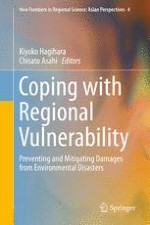
2016 | OriginalPaper | Buchkapitel
1. Sustainability and Human Well-Being
verfasst von : Kiyoko Hagihara, Chisato Asahi
Erschienen in: Coping with Regional Vulnerability
Verlag: Springer Japan
Aktivieren Sie unsere intelligente Suche, um passende Fachinhalte oder Patente zu finden.
Wählen Sie Textabschnitte aus um mit Künstlicher Intelligenz passenden Patente zu finden. powered by
Markieren Sie Textabschnitte, um KI-gestützt weitere passende Inhalte zu finden. powered by